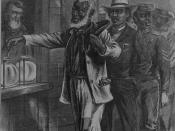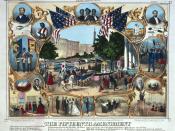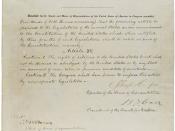The fifteenth amendment states: "Section 1: The right of citizens of the United States to vote shall not be denied or abridged by the United States or by any State on account of race, color, or previous condition of servitude. Section 2: The Congress shall have power to enforce this article by appropriate legislation." This amendment addresses the issue of suffrage for all races; it also granted the African American men the right to vote. Its main purpose was to enfranchise former slaves. It "was designed to close the last loophole in the establishment of civil rights for newly-freed black slaves."The fifteenth amendment was the last amendment to be adopted during the Reconstruction after the Civil War. The Republicans were the majority supporting the amendment. They saw it as a promise being fulfilled. The irony in this situation was that the African Americans in the north were not allowed to vote.
As expected, the confederate states were against the amendment.
"In its initial appraisals of this Amendment, the Supreme Court appeared disposed to emphasize only its purely negative aspects. ''The Fifteenth Amendment,'' it announced, did ''not confer the right ... [to vote] upon any one,'' but merely ''invested the citizens of the United States with a new constitutional right which is ... exemption from discrimination in the exercise of the elective franchise on account of race, color, or previous condition of servitude.'' 5 But in subsequent cases, the Court, conceding ''that this article'' has originally been construed as giving ''no affirmative right to the colored man to vote'' and as having been ''designed primarily to prevent discrimination against him,'' professed to be able ''to see that under some circumstances it may operate as the immediate source of a right to vote. In all cases where the former slave-holding States...


